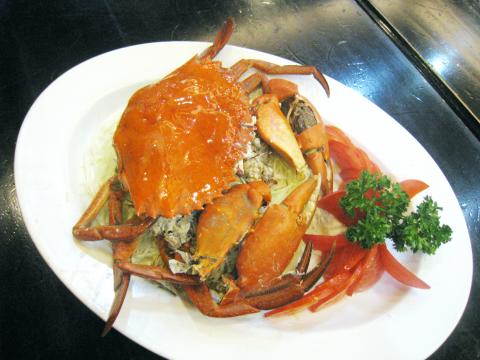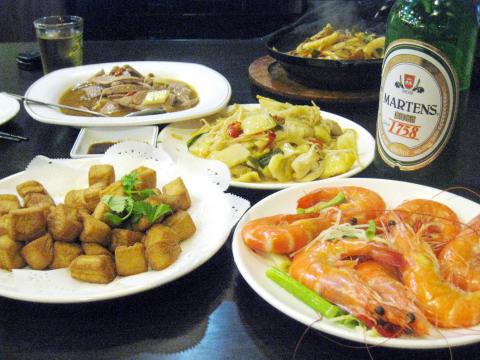A distinctive feature of Taiwan’s culinary landscape, the rechao (熱炒, literally “hot-fry”) joint is a perennial favorite with its fresh seafood, bargain prices and unpretentious atmosphere. I usually avoid such places, however, for several reasons, not least of which are the sometimes dirty surroundings, questionable hygiene standards, and inebriated men playing drinking games at a deafening volume while smoking like chimneys.
Located in the heart of Taipei’s East District (東區), Xanadu (鮮納肚) has restored my faith in rechao restaurants. Though boasting the typical trappings, including beer girls, it is an updated and much tidier version.
The interior is orderly and brightly lit; the utensils look clean. There is no fishy smell and smoking is not allowed until 9pm at the earliest, according to the restaurant’s very sociable proprietor.

Photo: Ho Yi, Taipei Times
Many of Xanadu’s dishes are made from offal. Popular dishes include sauteed pork liver (香煎豬肝, NT$100), which is delectably tender and doesn’t leave a metallic taste in the mouth like other restaurants’ versions do.
The extensive seafood menu includes sashimi platters of salmon, tuna, swordfish and squid that cost between NT$100 and NT$190 per dish.
The dragon balls (鹹酥龍珠, NT$150), or octopus mouths fried with scallion, chili and peanuts, come recommended, though they could be habit-forming.

Photo: Ho Yi, Taipei Times
Xanadu’s shuizhu pork slices (水煮肉片), boiled strips of pork and vegetables served with oil and spices, is a localized version of a Sichuan specialty. By localized, I mean the dish lacks the numbing quality of the Sichuan peppercorn. The dish comes in three sizes, with the smallest (NT$300) enough for a group of three.
The open seafood display offers options that are often not on the menu. Ask the waitstaff for recommendations, but treat the response with a healthy dose of skepticism. On a recent visit, my dining partners and I ordered a crab that cost NT$1,000 on the recommendation of our server. It turned out to be very disappointing.

Dissident artist Ai Weiwei’s (艾未未) famous return to the People’s Republic of China (PRC) has been overshadowed by the astonishing news of the latest arrests of senior military figures for “corruption,” but it is an interesting piece of news in its own right, though more for what Ai does not understand than for what he does. Ai simply lacks the reflective understanding that the loneliness and isolation he imagines are “European” are simply the joys of life as an expat. That goes both ways: “I love Taiwan!” say many still wet-behind-the-ears expats here, not realizing what they love is being an

Google unveiled an artificial intelligence tool Wednesday that its scientists said would help unravel the mysteries of the human genome — and could one day lead to new treatments for diseases. The deep learning model AlphaGenome was hailed by outside researchers as a “breakthrough” that would let scientists study and even simulate the roots of difficult-to-treat genetic diseases. While the first complete map of the human genome in 2003 “gave us the book of life, reading it remained a challenge,” Pushmeet Kohli, vice president of research at Google DeepMind, told journalists. “We have the text,” he said, which is a sequence of

Every now and then, even hardcore hikers like to sleep in, leave the heavy gear at home and just enjoy a relaxed half-day stroll in the mountains: no cold, no steep uphills, no pressure to walk a certain distance in a day. In the winter, the mild climate and lower elevations of the forests in Taiwan’s far south offer a number of easy escapes like this. A prime example is the river above Mudan Reservoir (牡丹水庫): with shallow water, gentle current, abundant wildlife and a complete lack of tourists, this walk is accessible to nearly everyone but still feels quite remote.

It’s a bold filmmaking choice to have a countdown clock on the screen for most of your movie. In the best-case scenario for a movie like Mercy, in which a Los Angeles detective has to prove his innocence to an artificial intelligence judge within said time limit, it heightens the tension. Who hasn’t gotten sweaty palms in, say, a Mission: Impossible movie when the bomb is ticking down and Tom Cruise still hasn’t cleared the building? Why not just extend it for the duration? Perhaps in a better movie it might have worked. Sadly in Mercy, it’s an ever-present reminder of just